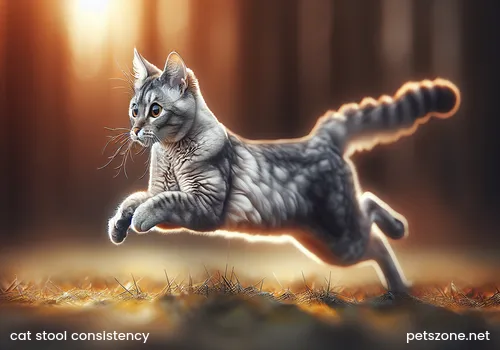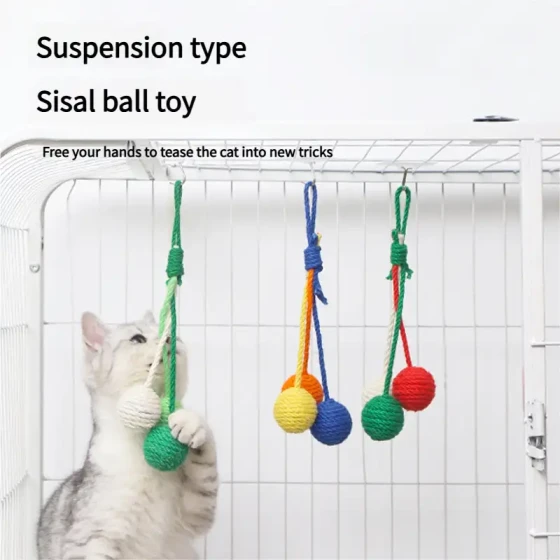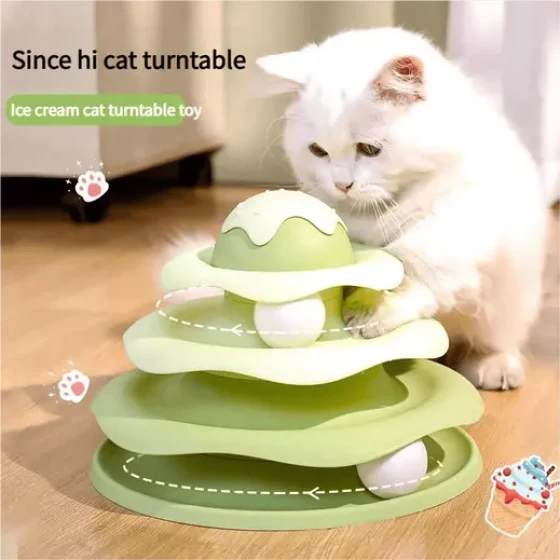Cat poop is normal but there is soft stool around the anus_Analysis of abnormal cat defecation causes
Cat defecation is an important indicator reflecting their health condition. When you find that most of your cat’s feces are formed but there is soft stool stuck near the anus, you may feel confused and worried. This situation is not uncommon and usually means that while the cat’s digestive system is generally functioning normally, there may be some minor issues at the end of the digestive tract.

Healthy cat feces should be dark brown, sausage-shaped or cylindrical, with a texture like clay that won’t easily break apart or leave too many traces when picked up. However, when you see formed stool but some unformed, soft, or even mushy stool near the cat’s rear or in the litter box, this is a form of abnormal defecation. Although most feces are normal, this "smudge of softness" near the anus might quietly be telling you something.
Why is it "hard in front and soft in back"?
This "hard in front and soft in back" condition may not be as severe as full diarrhea but indicates that the cat’s digestive process or the distal intestine may have some disturbance. There are many specific reasons; some are mild while others require attention.
-
Is diet to blame?
The cat’s stomach and intestines are quite sensitive, similar to some humans having a "fragile stomach." If you suddenly switch cat food or canned food, or the cat eats something unusual (like sneaking your snacks or suddenly given a large amount of meat), their gastrointestinal system might not adapt immediately. Imagine if you usually eat light meals and suddenly have hotpot; your stomach might rebel too. In this case, the front part of the stool may still be formed from the previous diet while the back part, stimulated by new food, hasn’t had time to fully digest or absorb water and thus becomes soft, sticking around the anus. Food allergies or intolerances may also cause intermittent soft stools. -
Stress overload and emotional factors?
Although cats often seem aloof, they are easily affected by environmental changes and emotions. Moving house, new family members (people or other pets), travel stress, or even small home layout changes can make cats nervous or anxious. This stress response affects intestinal motility, causing digestive disorders manifesting as soft stools or diarrhea. Sometimes, stress-induced soft stools appear especially in the latter part of the feces. -
The "mood swings" of intestinal flora
Cats’ intestines contain a large amount of beneficial and harmful bacteria forming a complex micro-ecosystem. If this balance is disrupted—due to diet changes, stress, or antibiotics—beneficial bacteria decrease and harmful bacteria increase, leading to intestinal dysfunction and soft stools. -
Parasite "disturbances"
Even if most feces appear normal, parasite infection cannot be completely ruled out, especially for cats without regular deworming. Intestinal parasites irritate the intestinal walls and impact nutrient absorption, possibly causing abnormal stool characteristics. If the cat’s spirits or appetite are affected, or mucus and even blood streaks appear in the stool, be alert for parasite infection. -
Hairball issues?
Cats naturally lick themselves, and most ingested hair passes through the digestive tract. But sometimes excessive hair or poor digestion can cause hairballs, which may irritate the intestinal walls during passage and affect stool form. -
Minor issues with anal glands
Cats have two small glands on either side of the anus that secrete a scented fluid, normally discharged with feces during defecation to mark territory. If these glands become blocked, inflamed, or infected, abnormal secretions may occur. Sometimes this secretion can be mistaken for soft stool near the anus. However, secretions from anal gland problems are usually small in amount and accompanied by the cat licking the anal area or rubbing its rear.
When should you see a vet?
If you find your cat’s stool is "hard in front and soft in back," don’t panic initially. If the cat is alert, eating normally, without vomiting, fever, or other discomforts, and this only happens occasionally, it could be mild dietary upset or transient stress, so observe at home for a day or two.
However, if any of the following occur, promptly take your cat to the vet:
* Soft stool lasts more than two days without improvement.
* The cat shows lethargy, reduced appetite, vomiting, or other symptoms.
* Blood, mucus, or abnormal colors (e.g., black, yellow) appear in the stool.
* The cat shows pain or discomfort during defecation.
* Kittens, elderly, or chronically ill cats have soft stools and should be more closely monitored and promptly treated.
What can you do at home?
Before veterinary care, you can try some supportive measures:
- Observe and record: Carefully note the shape, color, smell, and frequency of the cat’s stool, ideally take photos for the vet. Also observe the cat’s mental state, appetite, and water intake.
- Check diet: Recall if you recently switched food or the cat ate something unusual. If caused by food switching, try returning to the previous diet and use the “7-day transition method” in the future, gradually mixing old and new food.
- Provide sufficient water: Ensure fresh clean water is always available, encouraging the cat to drink more to aid normal digestion.
- Reduce stress sources: If stress is suspected, provide a quiet comfortable space and minimize stressors. Using feline pheromone products can help reduce anxiety.
- Temporarily adjust diet (with caution): Before veterinary advice, you may feed easily digestible food like boiled chicken breast (without seasoning) or prescription pet food. But fasting or dietary changes should be guided by a vet.
- Clean the anal area: For long-haired cats with soft stool stuck near the anus, carefully trim hair around the area and gently clean with warm water and pet-safe wipes to maintain hygiene and prevent infection.
Common Questions & Answers
- Q: My cat’s rear always sticks with soft stool. Are Ragdolls more prone to this?
A: Ragdolls have longer fur, so if soft or loose stools occur, it’s easier to stick to their rear. But "fragile stomach" is not exclusive to Ragdolls; cats of other breeds can also have soft stool for various reasons. - Q: Should I give my cat probiotics immediately?
A: Probiotics help regulate intestinal flora and may help mild stomach upset. But it’s best to consult a vet first because different situations require different treatments, and probiotics can’t solve all problems, especially those caused by parasites or infections. - Q: My cat has diarrhea but is mentally alert. Do I still need to go to the hospital?
A: If it’s occasional and the cat’s spirit and appetite are normal, you can observe first. But if it lasts more than 1-2 days or has other mild symptoms, veterinary care is advised to rule out underlying issues. - Q: Is diarrhea after switching food normal?
A: Rapidly switching food often causes gastrointestinal discomfort leading to soft stools or diarrhea. But this is not "normal," it indicates you need to transition foods more slowly. If diarrhea is severe or persistent, see a vet.
In summary, observing your cat’s defecation is a vital way to understand its health. When you notice normal formed stool but soft stool near the anus, don’t panic. Calmly observe and consider other symptoms to analyze possible causes. If symptoms persist or other discomforts appear, promptly seek professional veterinary help to help your "master" quickly regain health and vitality! After all, a cat’s health is no small matter, and as pet owners, we are always their strongest support.

-560x560.webp)
-560x560.webp)
